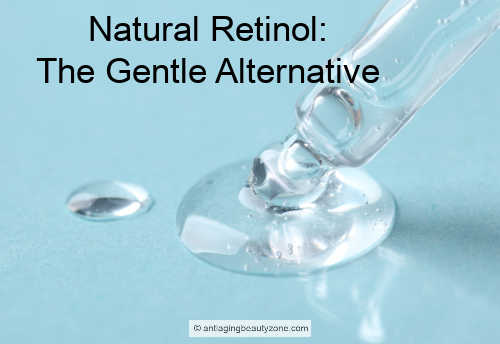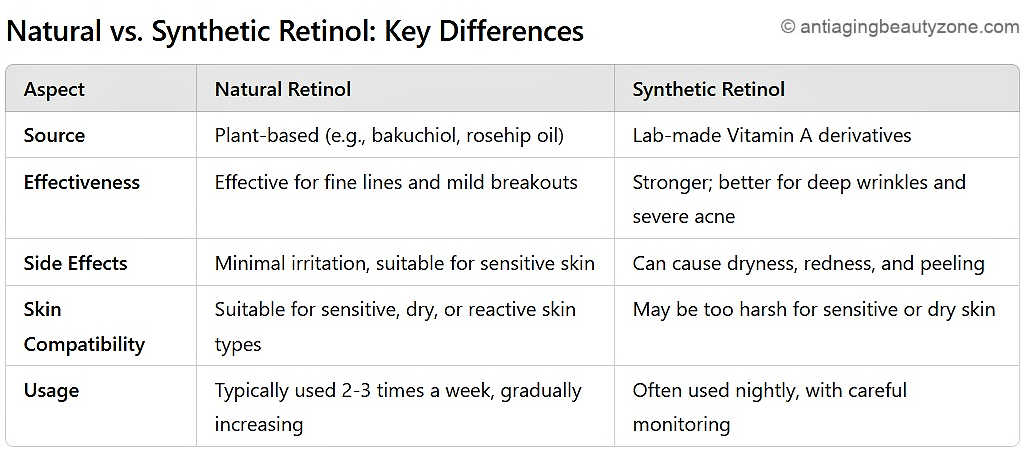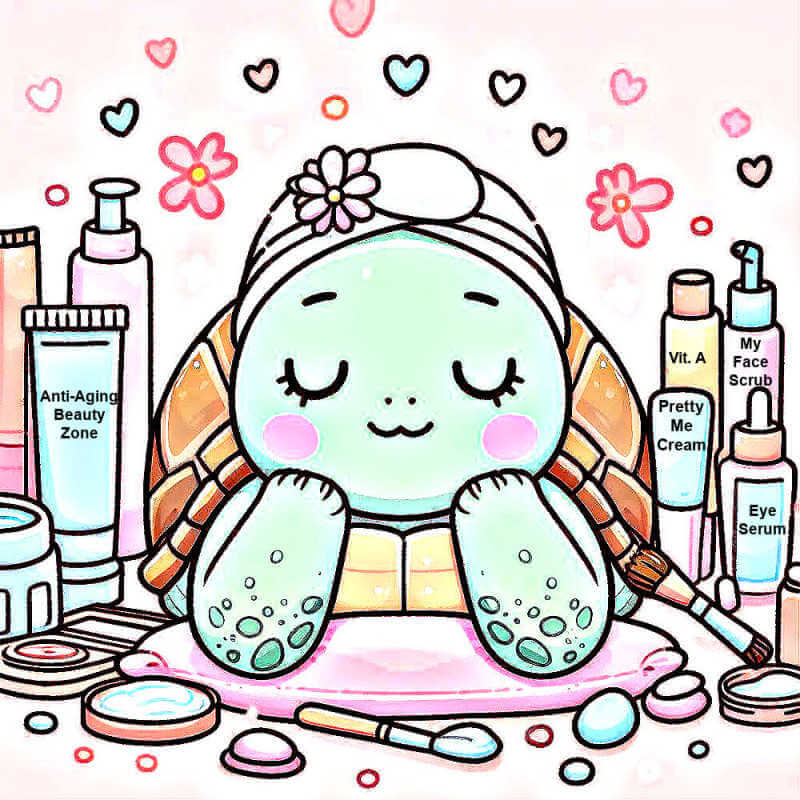- Home
- Retinol Skin Products
- Natural Retinol
I may earn from qualified Amazon & Affiliate purchases at no cost to you.
Natural Retinol: A Gentle Alternative for Smooth, Healthier Skin
by: Linda Robison / Facial Fitness Specialist @ ABZ
If you're looking for effective, gentle skincare, natural retinol might be just what you need.

Derived from plants, natural retinol alternatives offer benefits similar to synthetic retinol, like reducing fine lines and evening out skin tone, but with less risk of irritation.
Let’s explore what makes natural retinol unique and whether it could be a great fit for your routine!
The problem with retinol
Retinol is one of the best anti-aging breakthroughs in years—no exaggeration! It effectively fights wrinkles and improves skin texture.
But many people are looking for alternatives due to side effects like irritation, dryness, and increased sensitivity to sunlight. There are also concerns about using retinol during pregnancy.
That's why alternatives to retinol that target fine lines and other skin issues are trending. People are looking for options that are gentler on the skin but just as effective synthetic retinoids.
If you're exploring anti-aging products, consider these natural retinol alternatives. They can give you the results you want without the downsides of traditional retinol.
What are natural retinol alternatives?
Natural retinol refers to plant-based ingredients that mimic the skin-smoothing and collagen-boosting effects of synthetic retinol (Vitamin A derivatives) but with fewer side effects.
Common ingredients like bakuchiol, rosehip oil, and carrot seed oil are known for their retinol-like effects without the dryness, redness, or irritation often associated with traditional retinol products.
Natural vs Synthetic: Key differences

Natural Retinol:
Plant-based and usually gentler, making it a better fit for sensitive skin types. It can offer hydration and anti-aging effects without the irritation.
Synthetic Retinol:
Known for quicker, more intense results. Those with very oily or acne-prone skin may prefer this option but need to watch for potential side effects.
What are natural retinols made from?
Natural retinol isn’t just one ingredient; it’s a group of plant-based options that work like synthetic retinol. Popular ingredients to look for include:
Bakuchiol:
From the babchi plant, is a less irritating retinol alternative. It provides similar anti-aging benefits - reducing lines, boosting collagen - with minimal side effects. In a 12-week study, users saw improved wrinkles, tone, and elasticity.
Rosehip oil:
A natural Vitamin A that improves texture, reduces dark spots, and hydrates without retinol's dryness.
Carrot seed oil:
Beta-carotene supports skin health, protects against stressors, and enhances texture for smooth, even tone.
Other effective alternatives
Sea Buckthorn Oil:
Contains beta-carotene and omega fatty acids, ideal for hydrating and smoothing fine lines.
Algae Extracts (RetinART):
From Mediterranean microalgae, RetinART helps firm skin and reduce hyperpigmentation.
Retinaturel:
A bio-fermented retinol from salt-tolerant microorganisms, offering anti-aging benefits without irritation.
Which is right for your skin type?
Sensitive Skin: Natural options are usually safer and help avoid irritation.
Dry/Mature Skin: Plant-based ingredients offer anti-aging and added hydration.
Oily/Acne-Prone Skin: Synthetic retinol may be more effective for oil control.
Damaged Aging Skin: If you have deep wrinkles or sun damage, you might benefit from synthetic retinol.
Top natural retinol products to try:
Here are natural retinol products by category:
Best Overall:
- Algenist Green Microalgae Retinol+ Regenerating Serum - Anti Aging Serum with Plant Based.
- KORA Organics Plant Stem Cell Retinol Alternative Serum - Organic blend of Bakuchiol, Alfalfa Extract, Acai Stem Cells, Noni Fruit and Rosehip Oil.
Best For Sensitive Skin:
- HERBIVORE Bakuchiol Retinol Alternative - Bakuchiol + Peptides.
- Activated Night Serum - Retinol Alternative - with Reinhardtii (Algae) and Tremella Mushroom Extract.
Best Budget:
- Bakuchiol Face Serum Plant Based Retinol - Organic Bakuchiol, Niacinamide, and Tremella Mushroom.
- Burt's Bees Renewal Firming Moisturizing Face Cream - Natural Retinol alternative with Bakuchiol.
How to add it to your skincare routine
For mornings, apply natural retinol after cleansing and before sunscreen. In the evening, cleanse, apply natural retinol, and follow with a serum or moisturizer.
Tips to Maximize Benefits:
- Start Slow: Use 2-3 times per week, gradually increasing as your skin adapts.
- Patch Test: Test on a small area first to avoid irritation.
- Avoid Strong Actives: Don’t layer with synthetic retinoids or strong exfoliants (e.g., glycolic acid).
- Watch for Reactions: Stop if you notice redness, itching, or swelling. For any concerns, check with a dermatologist.
FAQ: Natural retinols
Question: Can natural retinol be used with other anti-aging products?
Question: Can natural retinol be used with other anti-aging products?
Answer: Yes, natural retinol alternatives can be used alongside other anti-aging products, such as hyaluronic acid, Vitamin C, and gentle moisturizers. Combining these ingredients can enhance results, but avoid layering with synthetic retinoids to reduce the risk of irritation.
Question: What is the difference between natural and synthetic retinol?
Question: What is the difference between natural and synthetic retinol?
Answer: Natural retinol is derived from plant-based ingredients like bakuchiol, rosehip oil, and carrot seed oil, offering anti-aging benefits with a gentler approach. Synthetic retinol, on the other hand, is a lab-created form of Vitamin A that is stronger and generally works faster on deep wrinkles, sun damage, and acne but may cause more irritation, especially for sensitive skin.
Question: How long does it take to see results?
Question: How long does it take to see results?
Answer: Results with natural retinol may take a bit longer to appear compared to synthetic retinol. According to studies, most users notice improvements within 8–12 weeks of consistent use.
Question: Can natural retinol cause skin irritation?
Question: Can natural retinol cause skin irritation?
Answer: While they're generally gentler, some people may still experience mild irritation, especially if they have very sensitive skin. To minimize the risk, start by applying it 2–3 times a week and gradually increase usage as tolerated.
Question: Is bakuchiol just as effective as retinol?
Question: Is bakuchiol just as effective as retinol?
Answer: Bakuchiol provides similar anti-aging benefits to synthetic retinol, like reducing fine lines and improving skin tone, but it’s not quite as potent. However, it is much gentler, making it a good alternative for those with sensitive or easily irritated skin.
Question: Are retinol alternatives good for really dry skin?
Question: Are retinol alternatives good for really dry skin?
Answer: Yes, many natural retinol alternatives, like rosehip oil and carrot seed oil, contain nourishing plant-based oils that can help hydrate the skin. While they may not be as intensely hydrating as a dedicated moisturizer, they do add some moisture and can be less drying than synthetic retinol.
Question: Can natural retinol be used with other anti-aging products?
Question: Can natural retinol be used with other anti-aging products?
Answer: Yes, natural alternatives can usually be combined with other anti-aging products, but it’s a good idea to introduce them gradually and avoid any potential irritants. See: How to add it to your skincare routine for more info.
Question: Are retinol alternative safe during pregnancy?
Question: Are retinol alternative safe during pregnancy?
Answer: Yes, natural alternatives like bakuchiol, rosehip oil, and vitamin C are generally considered safe during pregnancy, but it’s still best to consult your healthcare provider first.
About the Author:
Linda Robison is a Facial Fitness Specialist and the founder of Anti-Aging Beauty Zone. She shares expert insights on skincare, facial rejuvenation, and beauty treatments—blending traditional wisdom, personal experience, and science-backed research for both at-home and in-office solutions.
Before you go ....
Please tap on the💙in the bottom right corner if you found this page helpful. Also, Let’s CONNECT! Click the buttons below to follow me on social media.
Thanks so much!

